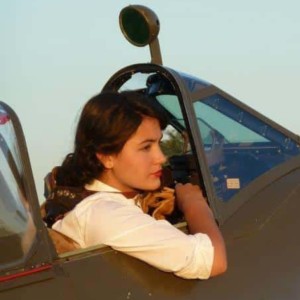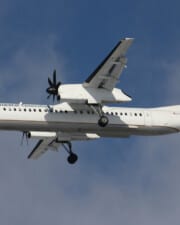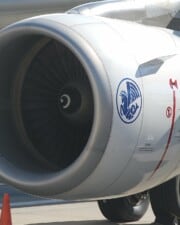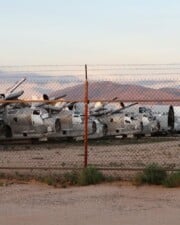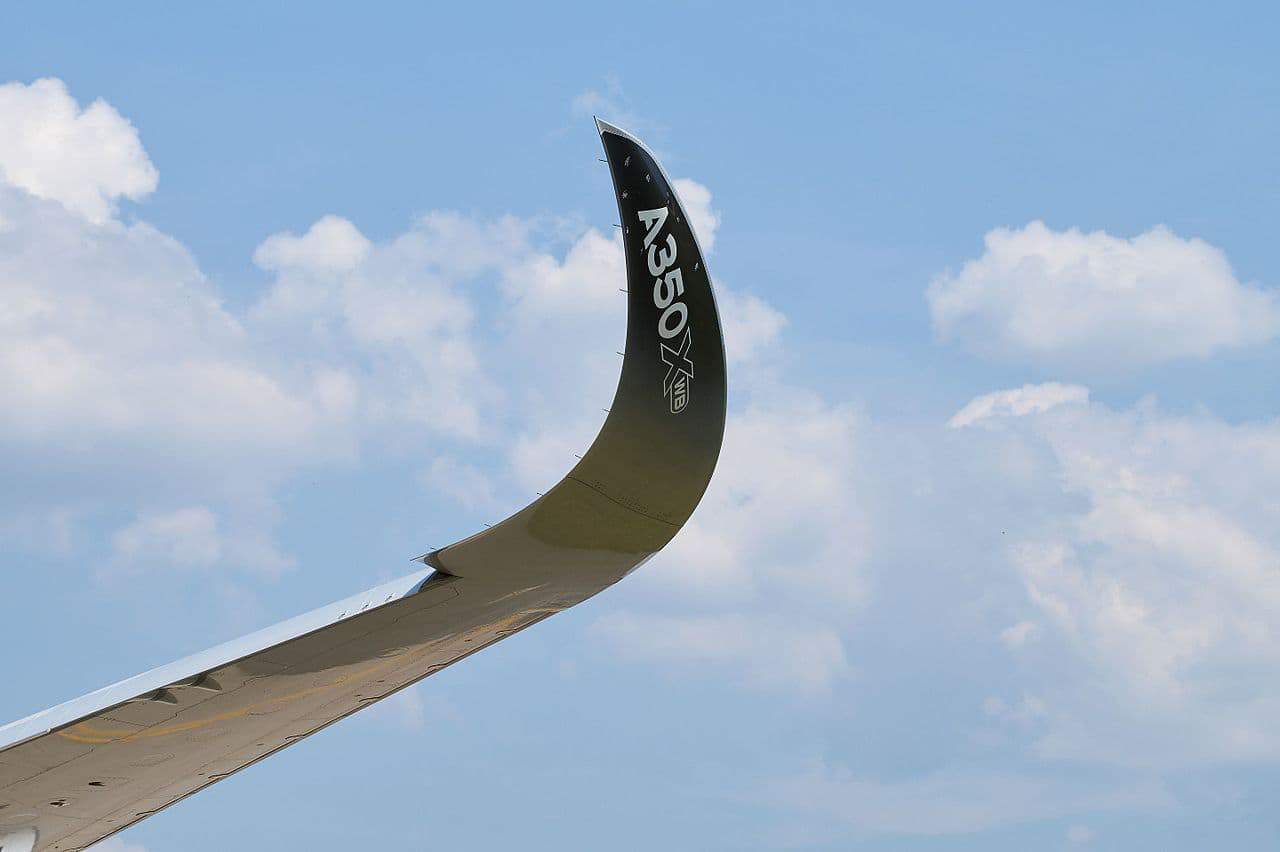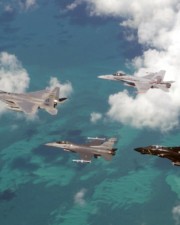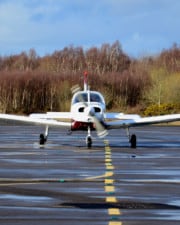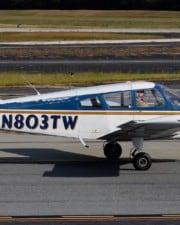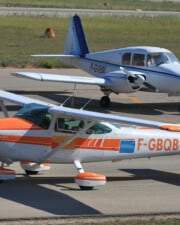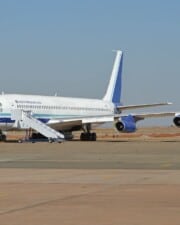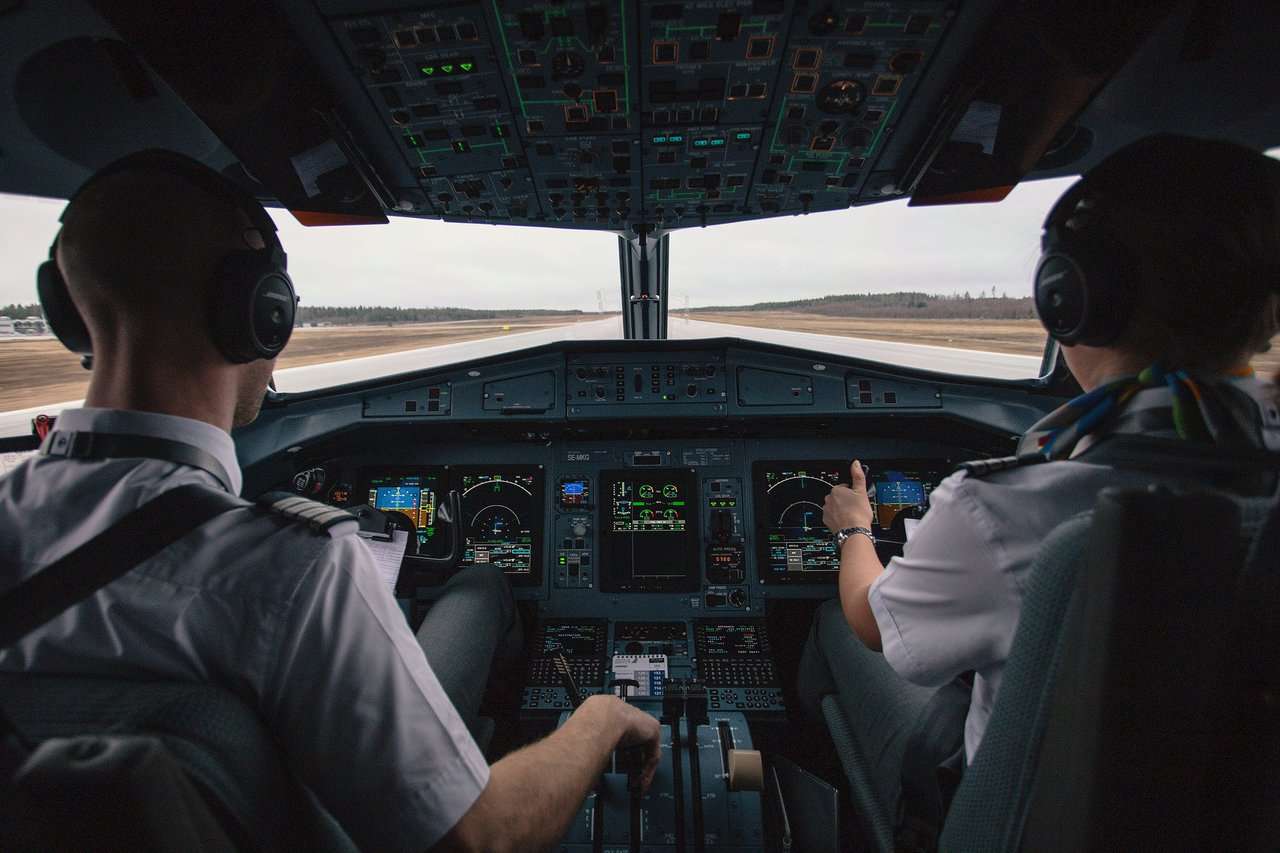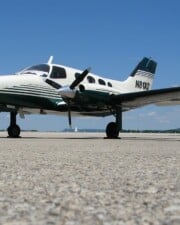Air Force One is possibly one of the most recognizable planes in the world, but who pilots it and does it take a special set of skills to fly the president? Read on to find out…
Table of Contents
TLDR – Air Force One is piloted by two US Air Force pilots, known as the Presidential and Deputy Presidential Pilots. Although there is always a third pilot onboard, in case a crew member should become incapacitated.
These crew members are from 89th Airlift Wing of the USAF Air Mobility Command, which is the military’s largest executive flight department. They have been serving in this capacity since 1966, when it inherited the role from the 1254th Air Transport Wing.
There are several pilots usually allocated the roles of Presidential and Deputy Presidential pilot, who are rotated throughout the year to allow for leave and emergencies. Due to national security reasons, their names are closely guarded secrets whilst they are serving.
The 89th Airlift Wing
The two iconic Boeing 747-200Bs are not the only jets operated by the 89th Airlift Wing. Their fleet also includes 15 business jets used to transport members of congress and other VIPs. The unit is exceptionally busy, carrying out over 6,500 missions and logging nearly 12,000 flight hours each year.
The Air Wing consists of over 1,100 personnel, of which there are 80 pilots and 89 flight attendants. Operating from Joint Base Andrews in Maryland, each member has been hand selected for this division from elsewhere in the Air Force.
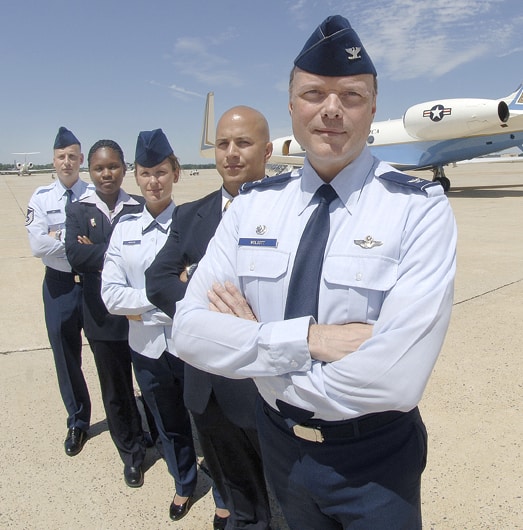
To be considered to join this unit as an airman, you have to have an absolute minimum of 2,500 hours – and that’s before you can get anywhere close to flying the president!
The Wing has the highest reliability rating within the Air Force. Col. Christopher Thompson says this is ‘because we only hire the best to serve in the 89th Airlift Wing, and each of our Airmen commit to perfection as the standard.’
How Do You Become A Presidential Pilot
The pilots assigned to fly the president are part of the Presidential Airlift Group (PAG). This group operates within the 89th Airlift Wing. Its pilots are very experienced, high ranking officers. Typically, they hold the rank of a Lieutenant-Colonel or Colonel, a position which requires 22 years of service in the USAF, if not more.
The 89th recently posted on their Facebook page what it takes to jump that final step to become one:
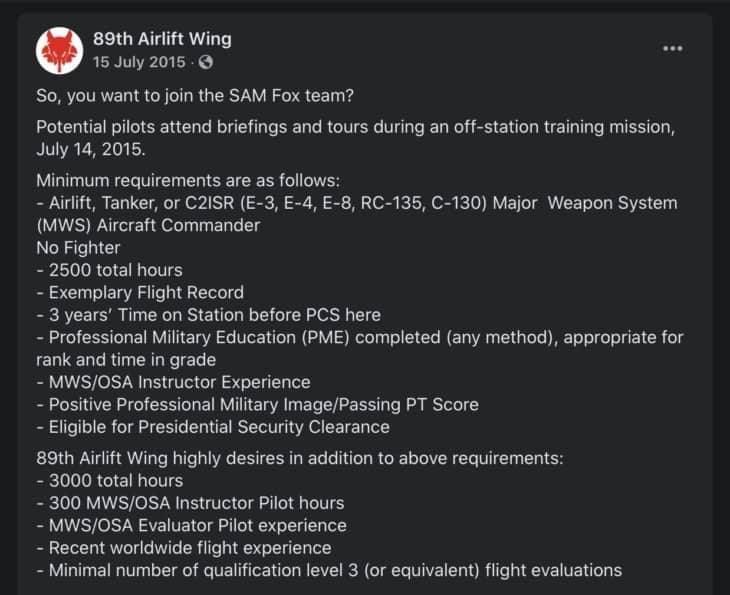
In addition to being extremely accomplished airmen, these crew members will be privy to sensitive information and so must achieve a ‘Yankee White’ category one security clearance. This is the highest security clearance possible in the US and includes checking the backgrounds of their close family members and friends too.
Col. Casey D. Eaton, the Commander of the 89th AW describes such individuals aptly during a speech. ‘Every single one of you is here for a reason, because you’re incredible airmen. You don’t just move people and stuff, you give the President of the United States options,” he said whilst addressing the formations of Airmen before him. ‘Everything this wing does is woven into the fabric of America and of its history.’
Air Force One Pilot Salary
Although the pilots get to fly in one of the most famous and high-tech planes in the world, the privilege of flying the president does not come with any financial perks. Presidential pilots earn the same base salary as any other pilot with their rank and experience.
According to the 2020 military pay charts, a pilot flying Air Force One would make somewhere in the region of $134,124 USD per year.
Do the pilots have to be US citizens?
With such tight security onboard Air Force One, you would expect that the pilots must be US nationals, and usually this is the case. However, one lucky RAF Wing Commander will soon become the first British national to get the chance to fly the president.
This may seem unusual, but the British and Americans have been swapping personnel since 1971, with the aim of strengthening relationships on both sides of the pond. The as yet unnamed pilot has served as a Staff Officer in the US for many years and will begin flying other aircraft within the 89th Airlift Wing before he can climb through the ranks.
Air Force One Pilot Uniform
Most Air Force pilots wear a khaki colour flying suit when operating their jets, but that is not the case for the pilots of SAM 28000 and 29000. Whilst ferrying VIPs, the pilots are most often seen in a classic navy blue MA-1 bomber jacket.
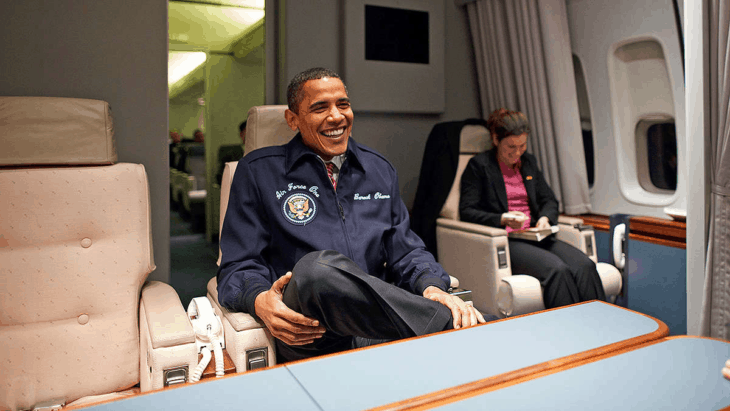
These bomber jackets have been worn by USAF pilots since 1950 and are popular among enthusiasts. President Obama even had his own jacket with his name and ‘Air Force One’ embroidered on the front. If you’re a fan, like Obama, you can even buy your own jacket from The White House Gift Shop.
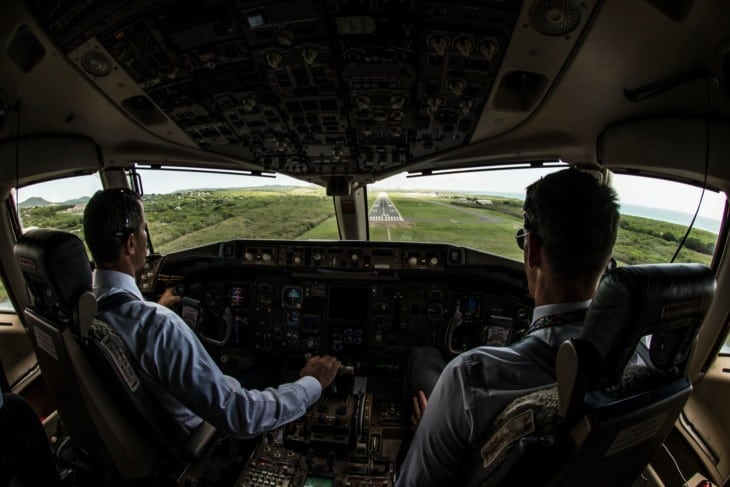
Beneath the jacket, were it not for their rank insignia, it would be easy to mistake the crew for commercial airline pilots in their white shirt and black tie. But crew do not always wear a uniform when flying the president.
When travelling abroad, many countries do not appreciate the presence of uniformed military personnel. When flying President Bush to Iraq in 2003, the President is pictured with the crew in their own clothes.
Air Force One Pilot Mark Tillman
Colonel Mark Tillman was the pilot flying Air Force One on the fateful day of 9/11. President Bush had been flown to Sarasota, Florida to visit an elementary school when the first plane hit the Twin Towers.
Whilst carrying out his usual pre-flight checks for the return trip to Washington D.C., Tillman was called to the upper deck of the Boeing 747 to see live TV footage of the smoking World Trade Center. Reporters were stating that a light plane had ‘accidentally crashed’ into the building, but Tillman thought otherwise. ‘There was a fog of war’ he later recalled.
The following flights were conducted with utmost secrecy, to ensure that the President’s location remained unknown and untraceable over the radio. To do this, Tillman and his crew talked on a secure phone line to the FAA command center and Air Force One essentially had control of the airspace.
This was not the first time Tillman and his colleagues had to keep the President’s whereabouts a secret. Check out the video below to find out about President Bush’s secret trip to Iraq in 2003.
How did Tillman become the Presidential Pilot?
Colonel Tillman is a Florida native has a degree in chemical engineering and had planned to return to civilian engineering after a brief stint in the military. But after designing rocket engines for the Air Force, Tillman realised that his future lay elsewhere and applied for pilot training.
Starting as a C-130 pilot, Tillman went on to work as an instructor on the T-37 before he was assigned to the 89th Airlift Wing VIP airlift unit to fly gulfstream jets carrying congressional officials, the first lady and other dignitaries.
In 1992 Tillman was finally selected to be an Air Force One pilot, but he wasn’t authorized to fly the president until a year later. By the time Bush entered the White House, Tillman had become Chief pilot.
Evasive manoeuvres
Flying SAM 28000 and her sister are just like flying a regular jumbo jet. The main difference is that airline pilots are not trained in aerobatics and evasive manoeuvres, whereas those behind the controls of Air Force One certainly are.
One pilot got to test out just how maneuverable Air Force One could be in an earlier aircraft, the C-136 Stratoliner. This airplane was used during the Kennedy and Nixon tenancies and played a large role in some of America’s historic political moments. You can read more about that here.
When flying President Nixon to visit Syria’s president, Hafez al-Assad, two Syrian MiG fighter jets appeared on either side of Air Force One. Seeing the fighters, pilot Colonel Ralph D. Albertazzie took immediate evasive action that lasted several minutes. Fearing an attack, he banked violently and even entered a steep dive.
Passengers were knocked to the floor and many wondered if they would even survive the ordeal. But unbeknownst to the pilot, the MiGs were only there to escort the plane and no attack had ever been planned – they were just being friendly!
References ▾
- https://www.jba.af.mil/About-Us/Biographies/Display/Article/845130/colonel-casey-d-eaton/
- https://www.dvidshub.net/news/201641/eaton-assumes-command-air-force-one-wing
- https://www.federalpay.org/military/air-force/colonel
- https://eu.jsonline.com/story/news/2019/09/10/air-force-one-pilot-vividly-describes-events-sept-11-terror-attacks/2203154001/
Related Posts
